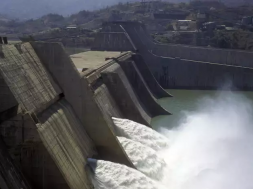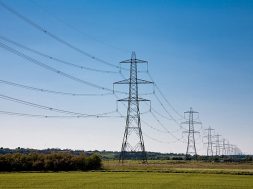
EQ In Exclusive Conversation With Mr. Manish Dabkara, MD & CEO – EnKing International
1.Tell us about your journey in the industry of climate change and renewable energy.
I’ll start with telling about our organization which I started in 2008-09. Back then in India, there were not many consultants in the climate change industry. Before I started my own consultancy company, I worked in an audit company- SGS.
There I observed that the consultants who visit for auditing of projects faced issues with quality. So, we thought of making a good consultancy company where quality issues can be managed and time taken for registration can be minimised at a reasonable cost.
From 2008-09 to 2015-16, we were majorly a consulting company. We developed many projects but lacked connections or adequate resources to sell the credit.
Later, we realized that we are only offering credit creation services but the customers also required revenue generation model by selling the generated carbon credit. For the generation of such revenue, there were many existing consultants available in Asia and developed nations. At that time, the carbon market was also low.
So, we started our own trading depth to sell carbon credit. Today, in that trading depth, we are the world’s largest carbon credit developer and supplier. We develop lots of our own projects and supply those credits through our trading list to the international carbon market.
In the world, about 90 per cent of registered projects in carbon credit are received from the renewable energy industry. Our projects also link to the renewable energy industry.
Today, we have more than 2000 clients across more than 40 countries. In Indore, we have our registered office, and we have our team across many parts of the country- Bangalore, Mumbai, Calcutta, Bhopal and many more. This way, we cover overall India.
In the international market, we have our team in Vietnam, Turkey, Mexico, Brazil, Argentina, Canada and more. We work in nine nations along with our team and work virtually in locations with fewer projects.
2.Your brand name says that you are the world’s largest carbon credit developer and supplier. Could you please elaborate on the development and supply of this carbon credit?
Our major work is to provide carbon credit advisory services through which projects generate credit and later sell those carbon credits. Any technology of project installed to reduce emission of one tonne CO2e get one carbon credit. For example, if a solar project generates 20 lakh electrical units then around 2000 carbon credit are generated.
It gets credits because it generates electricity with almost no emission. The same electricity generated from coal power plants consumes a lot of coal and also leads to a lot of emissions.
The solar project owner is responsible for the lack of emission. So, it gets carbon credit which it sells in the international market and gets extra revenue that boosts the return of their projects.
The boost varies according to the size of the project and country. It depends on the trade rate of the carbon credit. This is an additional revenue stream through which developing nations like ours, installing clean and green technology gets additional incentive so that the project becomes more financially feasible and viable. This is the concept of carbon credit.
There are different standards of carbon credit like Clean Development Mechanism, Verified Carbon Standards, Gold Standard, Global Carbon Council and many more international standards are available.
First, we register projects in advisory services and then get them verified every year based on the generation of electricity and carbon credits. We then find the buyer, sell carbon credit and bring revenue to the client’s account. Our major USP is that starting from document collection to revenue realization, we provide inbuilt service to the client.
We charge a fee from the client only when he/she gets revenue from selling carbon credit, making us a unique service provider. We cover the financial risks of our clients in our business model leading us ahead of our competitors.
3.Please tell us details about the progress of your company and what is your vision for the future?
From 2008 to 2015, our turnover was around Rs 1,55,000 in the financial year 2008-2009. Up to 2015, our turnover was less than three crores. After the expansion of our services, last financial year recorded turnover over Rs 193 crores. In next two years, we have a vision to cross a turnover of Rs 500 crores.
Recently, our company has launched its IPO that is listed on the Bombay Stock Exchange. Our IPO rate is Rs. 102. At the time of listing, on April 7, 2021, the opening rate was Rs 140.
Now, the trade date has crossed Rs 400. Our prediction for the future of the company is bright. Our investors/ shareholders also predict the same. Our market capitalization is around 250 crores on the Bombay Stock Exchange.
We anticipate that in the next two years, considering our growth and confidence/ trust of shareholders, it should be more than 1000 crores. We have only one target, to achieve a high top-line which we expect around 500 crores and our market capital to cross 1,000 crores, as per our company’s growth. This is the short term vision of our company.
4.How are you going to deploy the capital raised by IPO?
We will use the capital raised by IPO to develop more and more sustainability and community-based projects. We are currently executing more than 800 projects. Our working capital goes in generating more credits and bringing revenue to the clients at low financial risks.
5.Please tell us about other services that you offer.
We offer combination of services related to carbon credit and associated market mechanisms. First, we provide carbon credit advisory services in which we offer consultancy related to GHG Mitigation Programs which are also called carbon credit standards. In this, we handle registration and verification of projects.
The second is Carbon Offsetting, under which we supply carbon credit generated from our previous services. The third is Renewable Energy Attribute, an international renewable energy attribute similar to India’s REC program. It has its own criteria and standards. We offer adjoining services.
The fourth service is Carbon Footprinting and Neutrality where we help to determine an organization’s carbon footprint and design carbon neutrality pathway for it.
We estimate the tonnes of CO2e emitted in the atmosphere through every business activity which reflects carbon impression of the business on the environment and commonly known as carbon footprint of the business. We estimate it and provide strategies to optimize and eventually reduce the emissions and help them to become carbon neutral.
Next is Sustainability Reporting Service with which we help the client in sustainable reporting like GRI and more. Under Electrical Safety Audit, we help many banks, RBI, retail outlets, Oil and gas companies (like BPCL, IOCL) and others by conducting an electrical safety audit to stay safe and ensure that there is no scope for electrical hazards in their premises.
We also offer Business Excellence services, where we provide advisory and training services on complicated management standards like ISO 14001, ISO 50001, etc. Implementation of these management systems enable our client to adopt worldwide standard business processes and procedures.
6.Being in Indore, How challenging it was to establish, run and upscale your business?
Best manpower, professionals and experts prefer living in metro cities rather than Tier-II cities. From the beginning, it has been challenging for us. Today we have a team of more than 120 people which is amongst the world’s largest team in carbon credit consulting companies. It was quite challenging to develop manpower in Indore.
Another problem was we could not find candidates in Indore to hire from another company. So, we select candidates for internship, train them for around two years and provide them on-roll.
We have developed our own manpower. They are Indore-originated or Madhya Pradesh- oriented. Some members who belong to other states have now settled in Indore. We have developed a nice team by converting this challenge into an opportunity.
7.Please tell us about the past, present and future of the climate change industry?
Greenhouse gases help to maintain the average temperature on earth. There is no sunlight at night. So, greenhouse gases like CO2 trap heat during the day and emit it at night.
After the Industrial revolution of 1978, the concentration of greenhouse gases in the atmosphere has increased at an unprecedented rate due to excessive burning of coal. The burning of fossil fuels and coal led to an increase of gases like methane, CO2 and more which were trapping heat in the atmosphere. This whole mechanism is called the greenhouse effect.
The Earth’s temperature started rising due to an artificial boost in the greenhouse effect. This eventual led to excessive heating of the atmosphere which is commonly known as the phenomena of global warming and it was recognized in the 1970s.
All nations of the world along with the United Nations introduced a protocol to reduce global warming popularly named- Kyoto Protocol. Its implementation started across the globe in February 2005.
It stated that all developed nations are responsible for the current level of GHG emissions and they must do something to reduce their emissions. In case, they are not able to do then they are allowed to buy carbon credits from the projects located in developing nations like Brazil, India and more.
So, extra revenue received through extra climate finance and carbon credit will make our projects viable. From 2005 to 2020, we have seen that global temperature has increased by one degree. If rate of emissions continued to be same then the earth’s temperature will increase three to four degree by 2050.
The number and type of natural calamities the world is facing today will increase exponentially in future. To reduce this, Paris Agreement was signed in the year 2015 which stated that both developed and developing nations are responsible for this and they need to reduce their emissions.
For reduction of emissions, every country has submitted a Nationally Determined Contributions (NDCs) document to United Nations Framework Convention on Climate Change (UNFCC) on how they will reduce their emissions. Paris Agreement states that by 2050, the global temperature should not increase more than two degrees and should be capped at 1.5 degrees.
It also states that all nations have to become carbon neutral by the end of the century i.e. the amount of emission generated should be equal to the emission absorbed through forests or technology.
The future of the climate change industry is seems to be bright. By 2050, it is not very easy for countries to reduce their emission as reduction in emission is directly proportional to the reduction in consumption of fossil fuels which means turning to renewable energy, energy efficiency, forest and more. The requirement for these concepts is increasing gradually.
Every nation has two options- implementation of carbon tax like Singapore Government or the initiation of emission trading like European Union has done through European Union Emission Trading System (EU ETS). The majority considers emission trading as the best system to reduce emission in any nation. Every country is working on it.
8.Would you like to convey any message to our audience?
We should make our lifestyles carbon neutral. We can try our best by adopting different habits like replace use of plastic bags with bags made up of cloth.
We must try to minimize the use of electrical energy, reduce emission, decrease pollution and bring down waste generation. So that, we can help our country to meet the sustainability target of becoming carbon neutral. Nations can meet such target only when industries and individuals contribute to minimize the GHG emissions.


















